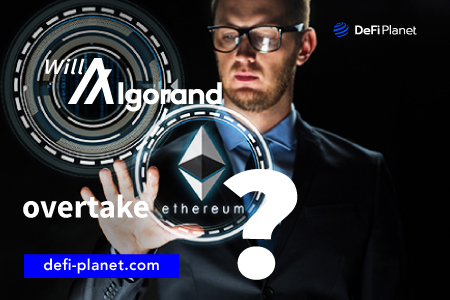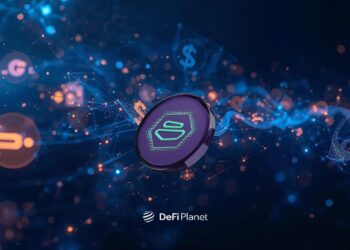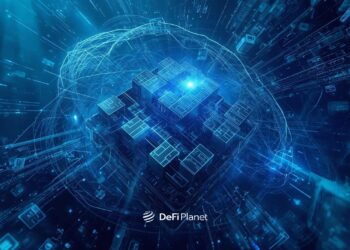Last updated on December 1st, 2021 at 05:29 pm
Launched in 2019, Algorand now exhibits traits that are somewhat similar to the “oldest kid on the block”. Even though the Algorand Blockchain Network is relatively new to the block, it has secured several partnerships. This is because of the unique features and use cases it presents.
Ethereum Network, a decentralized, open-source blockchain with smart contract functionality, redefined the entire blockchain ecosystem. Powered by Ether — its native currency, — Ethereum is home to thousands of decentralized applications.
Developed in 2019, many organizations in the financial, health, supply chain, energy, and automobile sectors of the economy, directly and indirectly, use the Ethereum blockchain to enhance businesses and promote security.
Algorand has several advantages like speed, scalability, and an effective smart contract, even as it bridges the centralized and decentralized worlds.
Algorand is a decentralized, open-source, and permissionless blockchain network. This infrastructure was built with the aim of solving the three major challenges of the blockchain — decentralization, speed, and security.
Algorand was founded by Silvio Micali, a computer scientist, and MIT professor. Designed to be a network focused on rapid transaction rates, Algorand is also striving to achieve near-finality. Finality in this case means processing over a thousand transactions per second and reaching transaction finality in less than five seconds.
The Algorand network is capable of hosting decentralized applications (dApps) as well as scalability. As the cost of gas needed to process and validate transactions keeps rising, DeFi traders and dApps developers have continued to look for alternatives. The Algorand blockchain network is one of these alternatives.
Ethereum is an open-source blockchain network that hosts several decentralized applications and is governed by its Ether native coin. These applications are immutable and users can interact with them. The Ethereum project was conceived in 2013 by Vitalik Buterin, a programmer.
The Ethereum network played a large role in the development of Decentralized Finance (DeFi) — a branch of blockchain-based finance that eliminates the need for intermediaries like banks or escrow companies. A number of DeFi protocols that allow users to borrow, lend, and swap crypto-based assets are hosted on the network.
From the development of tokens, both fungible and non-fungible, to the building of applications and smart contracts, DeFi is estimated to have over 92 billion USD locked in it. All thanks to Ethereum.
Also, there’s a boom in the creation of non-fungible tokens (NFT) exchanges on the Ethereum network. NFTs are non-interchangeable tokens tied to real-world items like art and digital works.
Similarly, a number of cryptocurrencies, categorized as ERC-20 tokens are developed on the Ethereum blockchain.
Major Similarities Between Algorand and Ethereum
Algorand and Ethereum have some similarities in common. These similarities include proof-of-stake consensus mechanism, open-source nature, being powered native coins, and decentralization.
Decentralization
Algorand and Ethereum are both decentralized networks — meaning both networks are not governed by a central authority. They operate without being influenced by the government, however, a group of computers called nodes maintain the integrity of the network.
This gives room for Algorand and Ethereum users to store just anything on the blockchain including cryptocurrencies, NFTs, and other important data. The decentralization feature plays a major role in the Ethereum and Algorand blockchain. These roles are outlined below.
- Unlike centralized storage systems that are error-prone, the Ethereum and Algorand network are fully organized leaving limited room for any kind of failure.
- The decentralized nature of both blockchains allows users to build just anything on the network by themselves. This means users have control to deploy applications, cryptocurrencies, NFTs, and other tokens.
- Both networks are less prone to malicious attacks because of their decentralized nature. An attacker will only succeed if he gains access to over 50% of the nodes controlling these networks. Because it is an expensive and daunting adventure, this almost always ends in futility.
- Decentralization eliminates the need for third parties.
- Decentralization promotes transparency because every activity that happens on these blockchains is replicated and distributed to all nodes connected to the network.
Proof-of-Stake Consensus Mechanism
Algorand and Ethereum both use the Proof of Stake (POS) consensus mechanism — a randomized process where participant nodes select a node to add the next block to the blockchain. That of Algorand is specifically called the pure proof-of-stake. The selected node is called a validator.
To become a validator, users must stake some coins or tokens for a certain time. As a general rule, nodes with the biggest stake or those with coins locked up for longer periods have greater chances of becoming a validator.
As a reward, validating nodes may receive all or part of the transaction fees accumulated during the creation of the block. Algorand validators are rewarded with ALGO tokens while Ethereum validators are rewarded with Ether tokens.
Open-source
Algorand and Ethereum are both open-source, meaning users and developers will have unlimited access to them. This makes them better than other patented decentralized ledger technologies.
Native tokens
Both Algorands and Ethereum ecosystems are powered by native tokens. While the former is powered by ALGO, Ethereum is powered by Ether. Besides offering ALGO tokens as rewards to validators, the coins are also usually split and distributed among all ALGO holders. This means holders of this digital currency are entitled to a certain annual percentage yield (APY).
Why Algorand and Ethereum Seem to be Competing
Previously, it was NEO and EOS. Now, just two years after its development, Algorand and Ethereum are seen to be major competitors. Both networks now compete in areas like dApps development and penetration into the global economy.
Both Algorand and Ethereum offer developers a platform to build decentralized applications that can be used by just anybody. Many organizations are striving to keep up with the trend by building protocols and applications on the blockchain.
Initially, there was so much buzz about Ethereum as home to thousands of dApps. But recently, developers have been on the lookout for better alternatives and Algorand seems to be one.
To promote adoption and increase developer activity on its blockchain, Algorand Foundation in 2020, launched a 250 million ALGO grants program. From then till now, major successful projects have been launched on the Algorand blockchain.
Similarly, Tether — an IDEX and stablecoin –has a protocol built on the Algorand network.
A number of organizations and developers are attracted to Algorand because of its speed, security, and scalability, with speculations that it will overrun Ethereum. However, the deployment of Ethereum 2.0 seems promising and may change things.
Where Algorand has an Edge over Ethereum
Algorand has an edge over Ethereum in aspects that will be addressed below.
Underlying technology
Being the world’s first open-source, permissionless, pure proof-of-stake blockchain protocol for decentralized finance, Algorand is said to provide high speed, security, and decentralization. The Algorand Standard Asset (ASA) empowers users to create tokens that exhibit the same features as its native ALGO tokens.
Another feature that makes this network attractive is the Algorand 2.0 infrastructure. The 2.0 protocol allows for instant transaction confirmation, enhances micropayments alongside wallet support.
Accommodating co-chains
Besides being an open-source public blockchain, Algorand also provides a private permissioned platform for organizations to segregate and control sensitive information. Algorand makes private and public blockchains interoperable. Interoperability is a means of communication between disparate blockchains.
The Algorand co-chains have the following features:
- Private and public blockchain interoperability
- Fine-grained control
- Has its own Algorand consensus algorithm
- Choose its own validators
- Transacting with other co-chains securely and efficiently.
Atomic transfer feature
The Atomic transfer feature provides a trusted pathway on the Layer 1 protocol to securely and simultaneously transfer a number of assets among specific parties. Once transactions are grouped together, all or none of the transactions are executed.
This feature has a number of use cases suitable for organizations. These include:
- Simplifying debt settlement
- Easily matched funding
- Instantaneous settlement of complex multi-party / multi-asset transactions
- Enhanced multilateral trade
In Conclusion…
- As the Ethereum blockchain continues to get crowded and gas fees keep rising due to the development of more and more NFTs on the blockchain, developers keep turning to alternatives. So far, Algorand is a promising alternative.
- The prospect of Algorand looks bright but we must keep in mind that Ethereum 2.0 may also offer insightful solutions to scalability and increasing gas fees.
- Usually, the cryptocurrency and blockchain space is filled with uncertainty and speculation. In a few years from now, Algorand may overtake Ethereum. This is currently evident as Algorand claims to have more speed, scalability, and security than Ethereum. Its smart contract, also, is regularly updated with new protocols.
- However, an area where Algorand is yet to catch up with Ethereum is the area of adoption. Ethereum has been around for over five years. This means Ethereum has more users than Algorand which was launched two years ago.
- Given the accomplishments of Algorand in just a short while, we expect to see more adoption and usage in the days ahead.





















